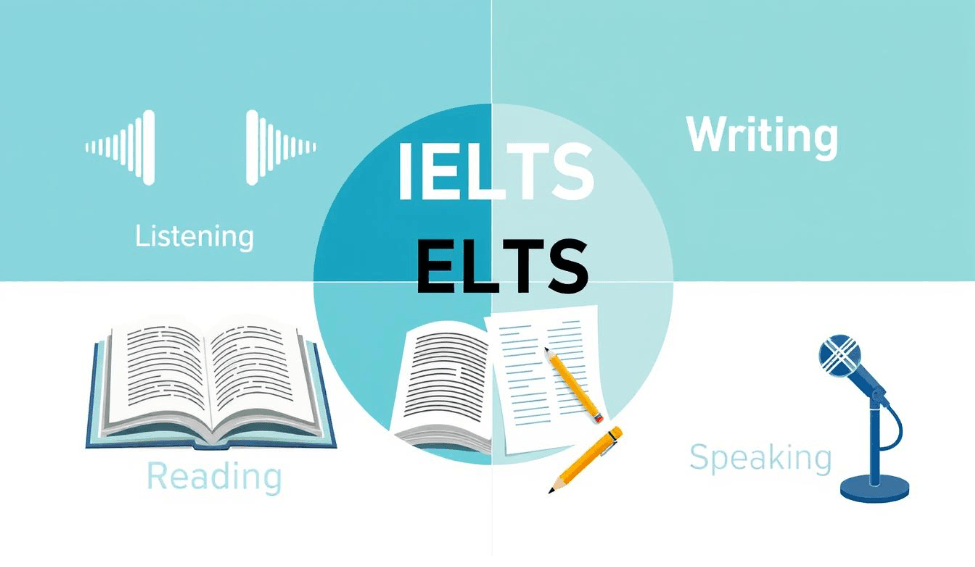The IELTS test opens doors to opportunities for studying abroad, immigration, working with international companies, or testing your communication skills. Learn how to prepare for IELTS and unlock your potential.
While English may have been the global language for centuries now, those living in developing countries like Bangladesh, still find it challenging to prepare for the IELTS exam because of language barriers, low language exposures, and limited resources. However, with few strategic guidelines, students can easily master their IELTS skill and achieve their dream score.

Why Take IELTS?
IELTS is the leading language test that allows you to assess your proficiency in English language. Every year, over 4 million IELTS aspirants sit for the IELTS test, making it the most popular English language test in the world. IELTS score allows you to pursue higher education, settle in your dream country, open opportunities to work for multinational companies and so forth. IELTS score is accepted by over 11,000 organizations in more than 140 countries, unlocking countless opportunities for individuals across various fields.
How to Start Your Preparation?
Preparing for the IELTS exam can be overwhelming at first, however, with some clear guidelines and directions, it will be a walk in the park! Allow us to guide you through it.
- Get Familiarized with the Format-
To start your IELTS preparation, first, you will need to understand the format of the test. The IELTS test assesses one candidate’s language skills in 4 different areas also known as modules. Those are- Listening, Reading, Writing and Speaking.
- Know your Goal-
Before you start your preparation, set your goal. Knowing what band score you need is important. Different fields have different band score requirements. Band score requirement also differs depending on the type (Academic and General Training) of the test you are taking. If you have fixed your eye on a band score, then you can start preparing accordingly.
- Take an Assessment Test-
To start your preparation, you will also need to know the level of your existing knowledge. As IELTS is a language test of English, more or less everyone is aware of the language. However, the question is, how well do you know the language? To find out your lacking, you will need to assess yourself on all 4 modules. Give a mock test or take a test from Cambridge English IELTS book.
After you have identified your strengths and weaknesses in all 4 modules, you can start your preparation by working on the areas you are struggling the most. For instance, in Bangladesh, most students face problems in the Speaking module, especially the students from Bangla medium. Speaking skill is something that cannot be improved within a week or two, especially when we do not have the opportunity to practice it that much in the context of our country.
- Create an Outline-
Kick-start your preparation by building an outline for the IELTS exam. Create a study plan for all 4 modules, addressing one skill at a time. Make sure you are creating the routine in such a way that it covers all modules before your IELTS exam date. Put aside a specific time period every day to practice the modules you are struggling the most at, even if it is for half an hour a day.
- Collect Trusted Study Materials-
Gather reliable materials for your practice such as official Cambridge English IELTS test books, Cambridge authorized audio clips, videos etc. Cambridge authorized materials will give you accurate information on IELTS test formats, rules & regulations, exam guidelines and so on.
- Develop Time Management Skills-
One of the problems students face while preparing for the IELTS exam is time management. All 4 modules of the IELTS exam will require you to finish different parts of the question within a given time limit. For example, in Part 2 of the speaking exam, you will be required to talk for 2 minutes on a given topic or for the reading module, you will have to finish answering all 40 questions within 60 minutes which includes transferring answers in the answer sheet.

- Take a Mock Test for Prepare for IELTS
To simulate a real exam environment, sit for mock tests in the same venue you have selected to take your main IELTS exam in. Taking mock tests in the same venue as your main exam will prepare you mentally for the test. Additionally, you will be able to assess and evaluate your test papers from professionals, which will further allow you to recognize your weaknesses and work on them.
Consistency is the key in the IELTS test. By practicing regularly with determination and proper strategy, achieving your desired band score will be a piece of cake! Get started on your IELTS preparation today and get one step closer to your dream.
What is the IELTS exam and who should take it?
The IELTS exam tests your English skills. It’s used by schools, employers, and immigration offices around the world. If you want to study, work, or move to an English-speaking country, this exam is for you.
What are the different IELTS modules?
IELTS has two main types: Academic and General Training. The Academic module is for higher education or professional registration. The General Training module is for work, training, or immigration.
What skills are tested in the IELTS exam?
The IELTS exam checks four skills: Listening, Reading, Writing, and Speaking. Each skill is scored separately. You get a total score from 0 to 9.
What are the different IELTS modules?
IELTS has two main types: Academic and General Training. The Academic module is for higher education or professional registration. The General Training module is for work, training, or immigration.
What skills are tested in the IELTS exam?
The IELTS exam checks four skills: Listening, Reading, Writing, and Speaking. Each skill is scored separately. You get a total score from 0 to 9.
How is the IELTS exam scored?
The IELTS scores range from 0 to 9, with 9 being the best. Each section gets a score, and you get a total score. Knowing how it’s scored helps you prepare better.
What are the first steps to prepare for the IELTS exam?
First, decide which module you need. Understand the test format and question types. Set goals, learn the marking criteria, and check your English level.
How can I improve my IELTS listening skills?
Improve by listening to different English speakers. Use movies, TV, podcasts, and radio. Practice understanding main ideas and details. Learn to take notes and get familiar with question types.
Use skimming and scanning to read quickly. Practice managing your time to finish all questions. Read various texts and get used to different question types.
Improve by listening to different English speakers. Use movies, TV, podcasts, and radio. Practice understanding main ideas and details. Learn to take notes and get familiar with question types.

